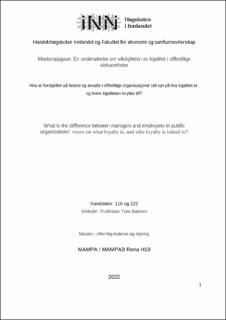| dc.contributor.advisor | | |
| dc.contributor.author | Johannessen, Christer Lejbølle | |
| dc.contributor.author | Dieset, Erik | |
| dc.date.accessioned | 2023-04-24T16:12:58Z | |
| dc.date.issued | 2022 | |
| dc.identifier | no.inn:inspera:110525064:43125251 | |
| dc.identifier.uri | https://hdl.handle.net/11250/3064715 | |
| dc.description.abstract | Denne undersøkelsen har gitt funn på at de intervjuedes syn på hva lojalitet er, og hvem lojalitet knyttes til i stor grad samsvarer med presenterte teori og forskning. Lojalitet knyttes i stor grad til det å være lovlydig, pålitelig, redelig, plikttro, ærlig, hensynsfull og rettskaffen.
Hva angår hvordan informantene håndterer en lojalitetskonflikt, ved bruk av mulighetene Exit, Voice and Loyalty – synes det at både det å varsle når noe ikke er som det skal, eller eventuelt å begå ordrenekt eller å faktisk slutte dersom lojalitetskonflikten blir uhåndterlig, er handlingsalternativer informantene i all hovedsak synes å ha et bevisst forhold til. Det er ikke avdekket nevneverdige forskjeller mellom ledere og ansatte i denne forbindelse.
Både ledere og ansatte synes å knytte sin lojalitet til regelverket de er underlagt. Begge grupper mener også at lojalitet til ledelsen og organisasjonen er viktig. I tillegg anser både ledere og medarbeidere det som lojalt å varsle der noe synes galt i organisasjonen. Allikevel later det til at ledelsen i større grad forventer lojalitet fra de ansatte (lojalitet til ledelsen), der de ansatte i større grad retter sin lojalitet til organisasjonen i sin helhet. De ansattes syn på hvor viktig det er å være lojal mot ledelsen, kan således avhenge av hvor frikoblet eller sammenkoblet ledelsen er som representanter for organisasjonen.
På bakgrunn av ovennevnte synes det at der medarbeiderne varsler med så sterk intensitet at ledelsen anser varslingen som illojal synes medarbeiderne at de fremdeles er lojale. Dette med bakgrunn i at medarbeiderne varsler i forsøk på å bedre organisasjonen som helhet og anser organisasjonen som noe større enn seg selv og ledelsen. | |
| dc.description.abstract | We are both employed in the public sector in Norway. Both of us are graduated from The Norwegian Police University College, and we have both been working as police investigators for several years. One of us is working in Oslo police district, and the other one is working in Økokrim.
This study has the academic issue: What is the difference between managers and employees in public organizations’ views on what loyalty is, and who loyalty is linked to? We consider this issue to be very interesting to learn about. We assume that loyalty is closely linked to motivation for the people who work in the public sector.
In the public sector, as in the private sector, employees and leaders will have to cooperate to get the best results. If the employees and leaders in the public sector have different perceptions about what loyalty is, and who their loyalty is linked to – that would be of great interest to discover in this study.
This study has shown, essentially, that employees and leaders in the public sector have the same view on the topic of what loyalty is. However, there are noteworthy differences in whom the loyalty is, and should, be connected to. Both leaders and employees are of the assumption that loyalty to written codes, loyalty to the management and to the organization are important. Where opinions differ is where leaders tend to demand loyalty from their employees, the employees are more proned to lean their loyalty towards the organization as something whole.
In light of this it seems that when employees view the leaders as rightful representants of the organization, their view of whom their loyalty should be connected to is in more line with the leaders view. In cases where the employees are of the assumption of that their leaders are disconnected as representants of the organization, the employees tend to lace their loyalty towards what they think is in the best interest of the organization. This can cause a situation where the leaders are of an opinion of that the employees are disloyal, even though the employees feel they are loyal to the organization. This occurs especially in cases where employees use their voice through media, and in situations where employees don’t follow the organizations ordinary routine for reporting accidents and unwanted events. | |
| dc.language | nob | |
| dc.publisher | Inland Norway University | |
| dc.title | Hva er forskjellen på ledere og ansatte i offentlige organisasjoner sitt syn på hva lojalitet er, og hvem lojaliteten knyttes til? | |
| dc.type | Master thesis | |
